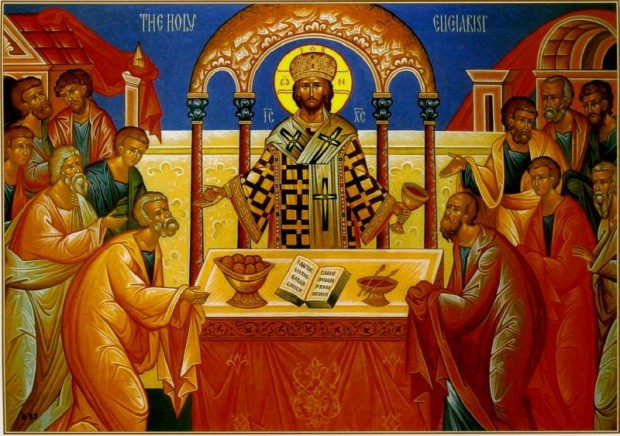Where thy kiss is, there is thy heart also

The liturgical kiss is no mere token. It is not a pious convention. It is, rather, a binding contract and a declaration, at once, of spiritual desire and of longing for communion with Christ. Saint John Chrysostom tell us that the kiss “declares to us the workings of the soul”. One can rightly say, “Where thy kiss is, there is thy heart also”.
Maurice Zundel, writing in The Splendour of the Liturgy, complements what Saint John Chrysostom taught us in yesterday’s lesson at Matins. Here, before the lesson from Saint Chrysostom, is a fragment of Zundel’s meditation on the liturgical kiss:
What does a kiss mean in the mysterious language of human love but this : You are my food, the reason of my existence, the source of my life?
That gesture is renewed here and acquires its full meaning. For it signifies the adherence of the entire man to the crucified Saviour. Here am I, to die with Thee, for Thee and at Thy hand : here am I, to live, no longer my own life but Thine. Love, it is true, always implies in its fundamental impulse this transfer of the entire being to another. But it cannot achieve it apart from God. And it is in Christ alone that love is aware of its own demands and fully realises its true nature. The Cross alone can so thoroughly dispossess a man of himself as to identify him really with another, by the free offering of a gift which regards only his true good. The most human loves have a mystical vocation. It is because they are ignorant of it that they so often issue in those appalling tragedies in which they deny themselves in their despair and torture themselves in their frenzy.
The Liturgy recalls them silently to their source by this morning kiss which buries our love in the agony and the death, the hope and the victory of the Only Son. This surely is the moment to commit our heart to God that He may fashion it at His good pleasure ; and to renew all our affections in the fire of His Spirit.
From a Homily by St John Chrysostom, Bishop & Doctor
“Salute one another with an holy kiss.” What is holy? Not hollow, not treacherous, like the kiss which Judas gave to Christ. For therefore is the kiss given, that it may be fuel unto love, that it may kindle the disposition, that we may so love each other, as brothers brothers, as children parents, as parents children; yea, rather even far more. For those things are a disposition implanted by nature, but these by spiritual grace. Thus our souls are bound unto each other. And therefore when we return after an absence we kiss each other, our souls hastening unto mutual intercourse. For this is that member which most of all declares to us the workings of the soul. But about this holy kiss somewhat else may yet be said. To what effect? We are the temple of Christ; we kiss then the porch and entrance of the temple when we kiss each other. See ye not how many kiss even the porch of this temple, some stooping down, others grasping it with their hand, and putting their hand to their mouth.
And through these gates and doors Christ both had entered into us, and does enter, whenever we communicate. You who partake of the mysteries understand what I say. For it is in no common manner that our lips are honoured, when they receive the Lord’s Body. It is for this reason chiefly that we here kiss. Let them give ear who speak filthy things, who utter railing, and let them shudder to think what that mouth is they dishonour; let those give ear who kiss obscenely. Hear what things God has proclaimed by your mouth, and keep it undefiled. He has discoursed of the life to come, of the resurrection, of immortality, that death is not death, of those other innumerable mysteries. For he that is about to be initiated comes to the priest’s mouth as it were an oracle, to hear things full of awe. For he lost his life even from his forefathers, and comes to seek it again, and to ask how he may haply find and get it back. Then God announces to him how it may be found, and that mouth becomes more awful than the very mercy-seat. For that mercy-seat never sent forth a voice like this, but spoke much of lesser things, of wars and such peace as is here below: but this speaks all about heaven and the life to come, and things new and that pass understanding.
And having said, “Salute one another with an holy kiss,” he added, “All the saints salute you.” By this also giving them good hopes. He has added this in the place of the kiss, knitting them together by the salutation, for the words also proceed from the same mouth from which the kiss. Do you see how he brings them all together, both those who are widely separated in the body and those who are near, these by the kiss and those by the written message? “The grace of our Lord Jesus Christ, and the love of God, and the Father, and the communion of the Holy Ghost, be with you all.” After having united them to one other by the salutations and the kisses, he again closes his speech with prayer, with much carefulness uniting them unto God also.
